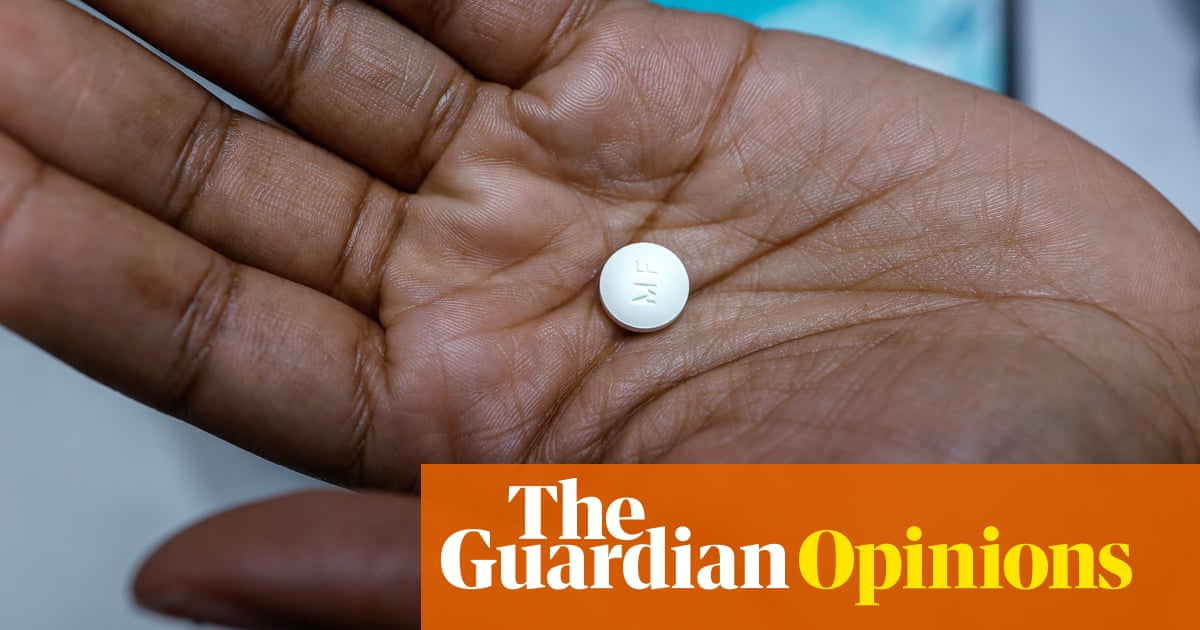Almosttwo-thirdsof USabortionsare induced with pills. The drug mifepristone blocks the pregnancy hormone progesterone, ending the growth of the fetus. Mifepristone was designed for abortions: its primary purpose, from its development through its regulatory approval and now on the market, has always been to allow women to control their own bodies and lives by ending their pregnancies. Because it exists as a tool of women’s independence, mifepristone has been the object of controversy, misinformation and intense scrutiny for the entirety of its existence. Originally synthesized by French pharmaceutical researchers in 1980, the drug went through a rigorous, prolonged and heavily politicized approval process in the US, and wasn’t approved by the Food and Drug Administration (FDA) for the US market until 2000.
The anti-abortion movement – including several prominent Republican lawmakers – is looking to undo that. Since the 2022 Dobbs v Jackson Women’s Health Organization decision that eliminated the nationwide right to abortion, women living in anti-choice states have relied increasingly on mifepristone, particularly pillsshipped by mail from providers in pro-choice stateswho prescribe the drug via telehealth. It is estimated that as many as 20% of abortions in the US are now accessed via telehealth appointments, a technological marvel that has allowed many people living in anti-choice states to avert the worst consequences to their lives, health and dignity that were threatened by the Dobbs decision by circumventing the unjust abortion bans that their states have attempted to impose on them. Dobbs has already been devastating for American women, causing needless deaths, driving up maternal mortality, derailing women’s lives, constraining their prospects, and injuring their standing as equal citizens. The post-2022 explosion of telehealth abortion using mifepristone is the reason why the consequences have not been even worse.
Now, Trump’s new FDA commissioner, Marty Makary, is under pressure to restrict access to the drug. Pressed by reporters at the Semafor World Economy Summit late last month, Makaray said that he had“no plans”to review the status of mifepristone. But he added a crucial caveat: that he would reconsider the drug’s accessibility if new information emerged about the drug’s safety. “If the data suggests something or tells us that there’s a real signal, we can’t promise that we’re not going to act on that data,” he said.
As if on cue, a conservative thinktank published a new study just days later that purported to find that mifepristone caused serious adverse effects in more than 10% of patients. The study – which contradicts all previous tests of the drug and the resounding consensus of the medical field – was published by the Ethics and Public Policy Center, a rightwing advocacy groupthat aims to“apply the richness of the Jewish and Christian traditions to contemporary questions of law” and “push back against the extreme progressive agenda while building a consensus for conservatives”.
The study was rapidly amplified on conservative social media, and was pushed by several Republican senators who had previously called on Makaray to ban mifepristone at his March confirmation hearing. Missouri’s Josh Hawley, the author of a book on “manhood” who onceraised a fistin solidarity with the January 6 insurrectionists, declared in astatementdirected at Makaray: “Well, the new data is here. And it’s a signal that can’t be missed: Mifepristone is not safe.” Hawley went on to urge the FDA to restrict access to the drug and revert to pre-pandemic regulations, in which mifepristone could only be dispensed by a doctor after multiple in-person visits: a regulatory regime that would cut off abortion access to millions of women in anti-choice states.
But the study that is being proposed as a pretext for restricting abortion access has come under scrutiny from doctors and statisticians for itsquestionable methodology. Drawing from insurance claim data from 2017 to 2023, the EPPC study claims that 10% of women who take mifepristone experience “sepsis, infection, hemorrhaging, an emergency room visit, or another serious adverse event within 45 days”. This would be alarming if it were true, but it isn’t.
Instead, the study seems to have been designed to dramatically overstate the side-effects of mifepristone, in part by counting the normal and intended functioning of the drug – such as vaginal bleeding as the pregnancy terminates and post-medication doctor visits to confirm the completion of the miscarriage – as serious adverse effects. The study also claimed that a vast range of health experiences in the 45 days following the medication – such as mental health symptoms – were caused by the drug, a claim that the data does not support. The EPPC study alsoseems to includethose who were prescribed mifepristone for non-abortion uses, such as miscarriage management, as well as those who took it alone, without the standard misoprostol dose that accompanies it. The study is not peer-reviewed and has not been published in a medical journal, because its authors could not meet the standards that such publication requires: their work is not up to snuff. Dr Stella Dantas, the president of the American College of Obstetricians and Gynecologists, called the paper “seriously flawed” and said that it “manipulates data to drive a myth that medication abortion isn’t safe”.
The truth is that abortion pills have a lower rate of serious complicationsthan Tylenol, and that the anti-abortion movement is in fact a great danger to American women’s health. It is because of abortion bans – not abortion access – that women in America are facing dramatically rising rates of “sepsis, infection, hemorrhaging” and death in pregnancy. In Texas alone, the rate of sepsis in pregnant women experiencing second-trimester miscarriages increased bymore than 50%in the years since the state’s near-total abortion ban went into effect, and experts say that the laws prohibiting abortion are the cause. The adverse effects that the anti-abortion movement sees in mifepristone’s availability is not a matter of women’s health, which they are indifferent to. It is women’s freedom.
Moira Donegan is a Guardian US columnist
